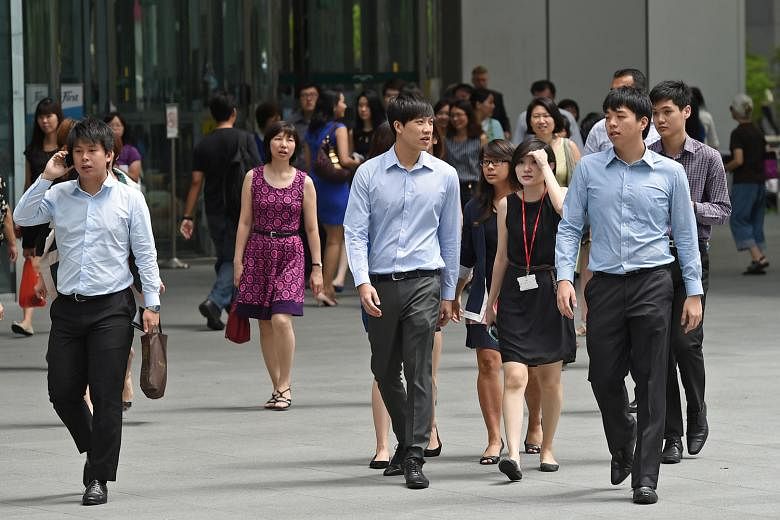SINGAPORE - The National Jobs Bank will evolve into an online marketplace that will help streamline the job hunt and career planning.
Manpower Minister Lim Swee Say told Parliament on Monday (Oct 10): "We will transform the National Jobs Bank into a one-stop and non-stop online marketplace. Jobseekers will be able to explore new career opportunities and conduct job searches anytime, anywhere without having to wait for the next job fair."
He was responding to questions from 12 MPs concerned about rising resident unemployment and retrenchments in the wake of a sobering report on the labour market released last month by the Manpower Ministry (MOM).
Mr Lim said this new portal would target jobseekers across age groups - whether fresh graduates searching for their first jobs, mid-career workers seeking a switch, or mature workers looking to stay active.
It would also help to streamline career planning through the Skills Framework, a new model that pinpoints the skills workers need to move up the career ladder and get the jobs they want in various industries.
Such frameworks have already been launched for the hotel and early childhood care sectors last month,with more to come in other sectors.
Mr Lim did not say when the new marketplace would be launched.
The first iteration of it was a two-week virtual career fair last month that offered 500 vacancies from 51 employers in sectors such as information and communications technology (ICT) and aerospace.
Mr Lim also told the House that MOM and its agencies have stepped up job matching and career services.
In the first eight months of this year, Workforce Singapore and e2i helped 20,000 jobseekers, with more than 13,000 finding jobs in sectors including ICT, healthcare, and early childhood care.
The number of successful job placements was 20 per cent higher than in the same period last year. Rank-and-file workers comprised 55 per cent of these, while 45 per cent were professionals, managers, executives and technicians (PMETs).
To help PMETs, who make up seven in 10 of residents laid off, the Government is increasing the number of Professional Conversion Programmes (PCPs), which help mid-career workers move to industries with growth potential.
Mr Lim said there were 22 PCPs at the beginning of the year, and this will increase to more than 50 by the end of the year.
He acknowledged that many were concerned that local employment growth has been flat, with a net increase of just 500 over the past 18 months.
While the resident unemployment rate has not risen sharply, it reached 3 per cent in June, exceeding the range of 2.6 per cent to 2.9 per cent for the first time in the past five years.
He noted that between 2012 to 2014, an average of 226,000 locals joined employment each year while 153,000 left, giving an average net increase of 73,000.
But last year, the number of locals entering jobs dropped significantly by about 36,000, while those leaving went up by about 37,000. This resulted in the flat growth in local employment.
Mr Lim said this was partly due to more people being laid off, and also leaving to pursue further studies and upgrading.
He noted, however, that the change was also because more of the baby boomer generation are reaching retirement - a figure that has doubled over the past two years - while fewer workers aged 15 to 24 were entering the workforce because of lower population growth.
These younger workers, he added, were mostly of a higher educational background and expected jobs of a better quality.
Mr Lim warned of a continued slowdown in the growth of the local labour force, which will become negligible or even stagnate by the mid-2020s.
He said, however, that it is important to balance the growth of foreign manpower. Taking in too many foreigners would make Singapore overly reliant on them, he added, but reducing this to zero would also cause growth to stagnate.
The annual increase in foreign manpower has dropped by more than two-thirds from 80,000 in 2011 to about 24,000 in the past two years.
"We are increasingly more selective in terms of qualifications and experience of the individual foreigners," he said.
"More importantly, to ensure that our people are treated fairly at all levels in all industries we have included the adoption of fair and progressive HR practices as part of our work pass criteria."
He said that as Singapore strives towards quality growth of 2 per cent to 3 per cent, businesses must transform and Singaporean workers must adapt to grow together.


